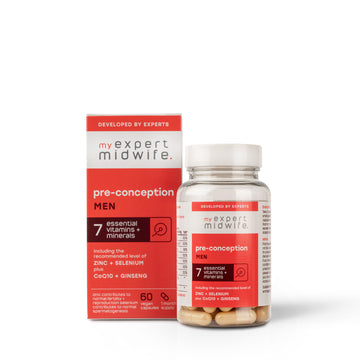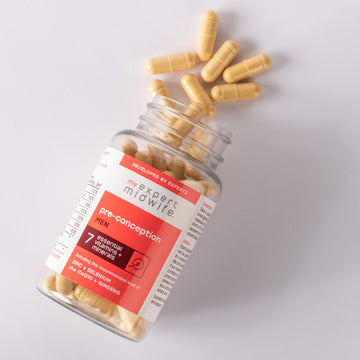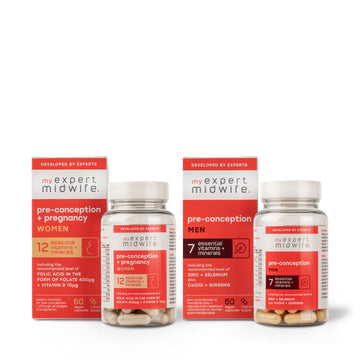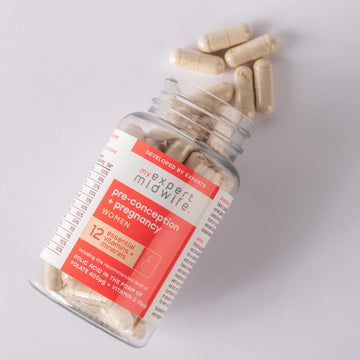Infertility is one of the most challenging aspects of being an adult. Trying to conceive (TTC) can be stressful and challenging but is much more common than people think. Check out our not-for-profit Trying to conceive kit and downloadable Trying to conceive guide.
About 1 in 7 couples face issues with fertility, and in approximately 50% of cases, these are due to problems with male fertility. While some matters need medical intervention and assistance, males have a huge benefit over females in that sperm cells are constantly being made in the testes.
Many micronutrients - vitamin and mineral supplements - may help increase sperm count and quality. Learning about these can help you understand some of the issues that may affect your sperm quality, inform you about what fertility supplements may be right for you and, perhaps, allow you to overcome male infertility.
What is male infertility?
Male fertility relates to a man’s ability to reproduce and get their partner pregnant. The causes of male infertility can be multi-faceted. Some issues may carry a genetic component or be linked to different illnesses or diseases (for example, cancer and its treatment), whilst others may be caused or worsened by suboptimal lifestyle choices. In the latter cases, lifestyle changes can significantly improve male fertility.
The first step is to understand the possible causes. The second is to tweak the diet, improve lifestyle and take the right male fertility supplements. Most of these changes are simpler to apply than you might think.
So, what are the possible issues that can affect male fertility?
- Sperm Count: The number of sperm in a given sample of semen. When this amount is reduced, there is less sperm available to fertilise an egg
- Sperm motility & morphology: We can all imagine what a healthy sperm cell looks like: similar to a tiny tadpole. To be able to fertilise an egg, sperm must have good motility – that is, be able to move well so it can meet the egg – and a normal morphology – be the right size and shape (morphology). If either of these qualities is affected, the odds of sperm navigating towards the egg successfully and fertilising it will be against them
- Seminal Fluid: The fluid that the sperm swims in. This has an important function, as a low level of seminal fluid can reduce the chances of sperm making it to the egg after ejaculation
- Libido: Also known as sex drive, it is our innate wish to have sex. When a man’s libido is reduced, it can be difficult to have sex at all, making getting pregnant very challenging
- Erectile dysfunction: Before a man can ejaculate, he needs to be able to get and maintain an erection. If this is not possible, trying to conceive without medical assistance can be very difficult
How can taking supplements help male fertility?
The first step to improving your fertility is to ensure you have a balanced and healthy diet and a healthy amount of exercise (more on this later in the blog). The second is to supplement with vitamins, minerals and other nutrients that may be difficult to obtain from foods in the necessary amounts.
Studies have shown that taking the right doses of those micro-nutrients to improve the quality and quantity of sperm can also help maintain a healthy male urological (reproductive) system in the long term.
When a man’s physical and sexual health is improved, this benefits their psychological health and, in turn, their approach towards trying for a baby. Taking control of what we ingest can, on a fundamental level, switch our mindset into a more ‘baby-making’ mode. When we do this, we are far more likely to make the right choices about what we put into our bodies, thereby helping our minds and bodies improve our fertility.
Taking a good quality supplement containing the micro-nutrients that we know scientifically improve fertility is a great way to begin this process.
Vitamins and Minerals that Increase male fertility
The good news is that within a relatively short time of taking the right supplements for male fertility, you can significantly improve your sperm production, sperm count and quality (motility and morphology) of your sperm, as well as the quantity of your seminal fluid and your libido. Good supplements and nutritional and lifestyle changes could also help with erectile dysfunction.
So, what are the essential vitamins and minerals to improve male fertility?
Vitamin C (Vit C)
One of the best-known antioxidants, vitamin C, can support the production and quality of sperm. Oxidative stress refers to the levels of oxygen reactivity that can negatively impact your body’s cells. Taking antioxidants helps to reduce oxidative stress, allowing your body to produce better quality sperm. Vit C is also vital for a strong immune system. A good immune system means that your body can focus its efforts on your fertility system rather than fighting disease.
Vitamin D (Vit D)
Vitamin D is known as the sunshine vitamin because we naturally produce it when our skin is exposed to sunlight. In the northern hemisphere (particularly in Ireland and the UK), primarily due to the weather and long dark winters. The need for sunscreen to reduce our exposure to harmful rays when the sun finally comes out can make getting enough vitamin D extremely difficult. This is why supplementation is essential. Alongside vitamin D’s vital function in bone health, the evidence suggests that men with optimal vitamin D levels have better sperm motility than those with low Vit D levels.
Zinc
Zinc is a mineral micro-nutrient. It isn’t stored in sufficient amounts in the body, so it must be taken daily, in the diet or through supplements. It has a vital function concerning libido, testicular health, sperm production, sperm health, seminal fluid and erectile health. Alongside other vitamins and minerals, it also plays a vital role as an antioxidant and boosts the immune system.
Selenium
Selenium is a vital mineral for normal testicular function. It contributes to normal spermatogenesis (production of sperm) and normal sperm morphology and motility. It also has antioxidative properties. Studies have shown that, combined with Vit E, selenium can significantly improve male fertility.
Co-Enzyme Q10
You may have heard of Co-Enzyme Q10 concerning skin care. Still, it also has been shown to have an essential role in improving semen quality – particularly regarding sperm concentration and the motility of sperm.
Siberian Ginseng
For many centuries, Siberian ginseng has been used in eastern medicine for its health and aphrodisiac effects. In recent years, its benefits have been scientifically studied, and although research is still ongoing, it is thought that it may increase sperm count. Other benefits include reduced stress, increased energy levels and an enhanced immune system.
Vitamin B12
Scientific studies have shown that getting enough B12 can positively affect sperm count and motility and reduce DNA damage within sperm.
Folic Acid/ Methyl folate
Folate levels measured within sperm directly conclude that healthy sperm have healthy folate levels. The evidence shows that low folate correlates with low sperm production and poor DNA stability. Interestingly, many humans have difficulty converting folic acid - the synthetic form of folate - into its usable form in the body. Studies are now suggesting that taking folate in the form of methyl folate can significantly improve the absorption of this vital micronutrient. It is, therefore, advisable to favour folate supplements containing methyl folate rather than folic acid.
What else can men do to increase fertility?
As previously mentioned, increasing fertility and switching to ‘baby-making mode’ begins with healthy lifestyle choices, including moderate exercise, reducing body fat, decreasing stress and getting enough sleep. There are also other basic things you can do to help, like wearing underwear that isn’t too tight – namely, ‘dad’ style boxers that help keep your testes cooler and, thus, improve sperm production. The false narrative is ‘saving up sperm,’ i.e. leaving long periods between having sex to increase sperm count in the ejaculation.
This is a false myth, as sperm is constantly produced, and any sperm that has not been ejaculated will eventually be reabsorbed into the body. Having sex 2 -3 times/week, particularly during the woman’s fertile window (the 3-4 days before and during ovulation), has increased pregnancy chances.
However, making your sex life all about baby-making can add hugely to the stress of the occasion. So, frequent sex throughout the month, instead of just focusing on fertile windows, can reduce the negative effect and pressure on ‘performance’.
Fertility Vitamins For Men - The Key Takeaway
Taking a good quality fertility supplement for men that contains all the vital ingredients, in the right amounts, to aid male fertility is one of the best ways to help further your chances of conceiving. As always, if you have any concerns, taking a trip to your GP to chat about your fertility, alongside talking openly with your partner, can help answer questions and tackle issues. Remember, male infertility is a common issue. You are not alone, and there is much you can do to help yourself - having the right supplement as part of a healthy lifestyle is a superb starting point.
For more information about fertility supplements, visit our supplements hub today.







